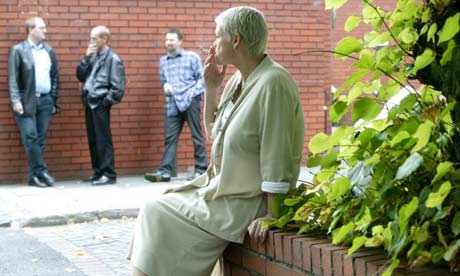
Smokers could be forced to light up away from the entrances to public buildings under government moves aimed at ensuring that no more than one in 10 Britons smoke cigarettes.
The health secretary, Andy Burnham, now favours extending the 2007 landmark law which banned smoking in pubs, workplaces and other enclosed places, to prevent non-smokers having to walk through clouds of secondhand smoke.
The move comes as part of a wider attempt by Burnham to set out the case for state intervention to improve public health, insisting it does not amount to a nanny state. He will set out four principles where he says intervention is justified: where it protects the health of children, where a person's choice affects the choices of others, where barriers need to be removed to allow people to behave healthily, and where the environment can be shaped to offer healthier lifestyles.
Tomorrow's announcements will encourage cars and homes to remain smoke-free, but Burnham will stress that the state does not have a right to intervene in a private space, even to protect children. His department plans to "work with the public sector, business and the public to communicate the dangers of smoking in the home and the car".
Leading medical bodies such as the UK Faculty of Public Health back a legal ban on smoking in cars containing children, as does doctors' leader Professor Steve Field, who called it "a form of child abuse". But concern over what could be portrayed as an unwarranted interference in human rights is likely to limit any government action in advertising campaigns.
Burnham will also "carefully consider" the case for forcing all cigarettes to be stripped of their distinctive wrapping and sold instead in plain brown packets, in order to reduce their appeal. There will also be renewed action against black market tobacco, a ban on tobacco vending machines and extra NHS support for those who want to quit.
"This new strategy is a solid foundation for the future," said Deborah Arnott of Action on Smoking and Health. "The 2007 legislation was ground breaking. But there are gaps in it which still expose people to the harmful effects of secondhand smoke, especially children."
Firm action against smoking during the past decade, such as banning advertising and raising the age of purchase from 16 to 18, has reduced to 21% the proportion of people who smoke. Ministers now want to get that down to 10% by 2020.
In a speech hosted by the thinktank Demos, Burnham will also publish reports from Richard Reeves, Geoff Mulgan and Sir Howard Bernstein on the principles of influencing individual behaviour. The reports will urge the government to recognise that change has to go with the grain of human behaviour, and will prove ineffective if it is too idealistic.
Field, the chairman of the Royal College of General Practitioners, welcomed the proposals but urged ministers to be more radical. "We need to do more to protect children," he said. Shopkeepers should have to have a licence to sell tobacco, which they would lose if found to be selling to under-18s, and there should be a complete ban on smoking in British-made television programmes.
"Only recently, Deirdre Barlow in Coronation Street was seen smoking and lecturing another character, who was drunk. Seeing smoking in a dramatic context can make it seem glamorous to young, impressionable people", said Field.
Christopher Ogden, chief executive of the Tobacco Manufacturers Association, said the plans would "do nothing to meet public health policy objectives, but will instead impose further unwarranted restrictions on legitimate businesses and private citizens alike".
Jean King, director of tobacco control at Cancer Research UK, said smoking was still the UK's largest cause of preventable deaths. "It is vital that work is done to ensure parents know how dangerous it is to smoke in front of their children," she said. "Breaking the cycle of tobacco addiction and preventing another generation from becoming addicted must remain a priority for us all."

